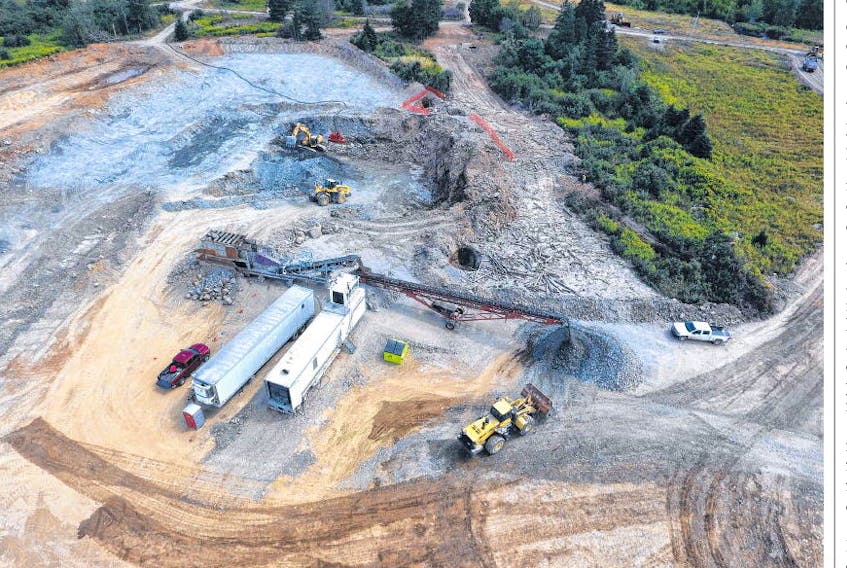The Nova Scotia Utility and Review Board issued a precedentsetting ruling last week in awarding a Moose River Gold Mines man maximum compensation for loss of use of his land after it was expropriated to make way for a new mine.
“When given the privilege and right to expropriate a person’s property, there is an equal responsibility to pay all compensation under the Expropriation Act,” the UARB said in its decision. “This includes the losses experienced before the expropriation, often referred to as the ‘shadow period.’ A mining company is put in the same position as the Crown engaged in a public work.”
D.D.V. Gold, which later became Atlantic Mining NS Corp., purchased about 60 properties for its Touquoy gold mining project near Middle Musquodoboit starting in 2005.
The company had initially talked to Wayne Oakley about purchasing his two-hectare parcel on Mooseland Road in 2008, after the mine had received provincial approval, according to a written ruling issued on Friday.
While Oakley thought they had agreed on a price, company representative Walter Bucknell disagreed and eventually the mining company had Oakley’s property expropriated four years later.
Oakley, who had lost a hand years earlier, had been building a house on the land but stopped when it became clear the gold mine was going ahead and needed his property, along withdozens of others in the area.
So Oakley put some of his belongings into storage and bought another piece of land where he planned to relocate his home.
Under provincial law, when a home is included in a property expropriation, compensation has to leave the homeowner in substantially the same position as they were in before the deal, the UARB said.
According to the ruling, no one in Nova Scotia has ever had their home expropriated along with their land, and the only two jurisdictions in Canada with similar expropriation laws also had no precedents.
The board also had to consider what is known as disturbance, in which a property owner’s use is interrupted for a period of time before expropriation takes place.
In this case, the UARB decided it was reasonable for Oakley to be compensated for disturbance of around eight years because he had stopped construction on his house, bought property elsewhere and moved belongings into storage.
That included the “shadow period” of two years between the time when Oakley thought he had a deal with the company and when expropriation became official, and an additional four years after the company began talking publicly in 2004 about the possible need to acquire properties for a gold mine in the area.
“The ordinary meanings of the words ‘losses’ and ‘disturbance’ are very robust,” the UARB said. “The former includes the loss of virtually anything. Its wide range in an expropriation context may encompass being deprived of one’s property and home; losing the calm, rest, order, and quiet of one’s life; losing time which could have been spent on other matters; having an interruption in their life; being agitated, worried, unsettled; or experiencing a disadvantage or detriment.
“As with other broad terms, the board has not attempted to determine an exhaustive list of losses. Rather, the types of losses will be dependent upon the facts and circumstances of each individual case. “While the types of compensable losses are virtually limitless, they are confined by the maximum award of up to 15 per cent of the market value of the lands.
They must also meet the criteria of being reasonable and arising out of or incidental to the owner’s disturbance.
“In conclusion, the board finds that under the Nova Scotia Expropriation
Act, an owner’s disturbance begins when ‘the process of being disturbed’ started for the mine for which the owner’s property and home were ultimately expropriated.
“In this case, the board finds the break in the landowner’s calm arose at least by the date of (the mining company’s) first open house in August 2004, when it announced its plan to potentially develop the mine and its need to purchase properties in the area if it does so.”
It also found that compensation is required not just for direct financial costs incurred, but also for any losses such as loss of rest or calm, or creation of worry.
“The board finds that under the Expropriation Act in Nova Scotia, compensation for an owner’s disturbance is not limited to pecuniary losses and does not require there to be an actionable wrong,” the UARB said.
After expropriation, Oakley and the company agreed on a value of $305,000 for his property.
The maximum compensation for disturbance in Nova Scotia is 15 per cent of the market value of a property. Oakley was awarded $45,750 for disturbance, which is the 15-per-cent limit.
A spokesman for Atlantic Mining said the company hasn’t decided if it plans to appeal the ruling.
“Atlantic Gold is pleased to have brought over 200 full-time jobs along with additional associated economic benefits to rural Nova Scotia,” Jim Millard, manager environment and permitting, said in an email.
“However, we are examining the Nova Scotia Utility and Review Board decision to enable us to measure the impact on our business, our stakeholders and further potential development in the province.”









